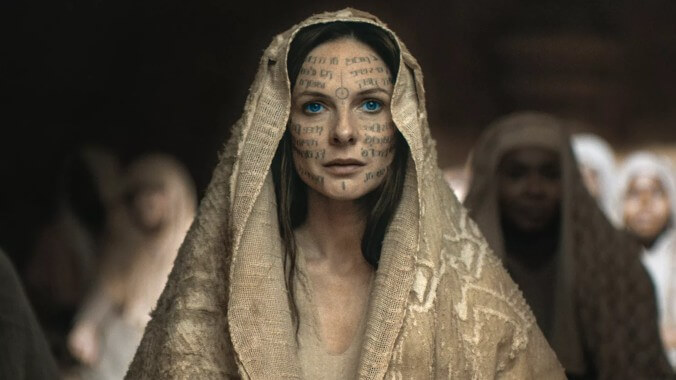‘Dune 2’ Is a Perfect Movie Except for the Frequent Cuts to a CGI Fetus
I don't think Denis Villeneuve—who's on the record as being "pro-choice"—meant to make a fetal personhood argument, but I remain very skeptical of these scenes.
Photo: Warner Bros EntertainmentMovies
Halfway through our showing of Dune 2, my friend leaned over to me and asked, “Was this funded by anti-abortionists?” I’d been mulling a similar, half-joking thought since one of the first scenes, which shows a CGI embryo floating in the inky darkness of, we surmise, Lady Jessica’s womb. By the time my friend whispered to me, this embryo had grown into what was more recognizably a fetus—if screenshot, it would look at home on an anti-abortion sign waved outside a Planned Parenthood.
At this point, it had already been revealed that Jessica talks to the fetus, that it understands the political forces on the other side of the uterus wall, and that it will become Paul Atreides’s younger sister, Alia, who later briefly appears as a full-grown adult Anya Taylor-Joy in one of Paul’s visions. I don’t know much about her yet (I have not read the books but I do have a Dune boyfriend), but the film’s focus on Alia’s fetal development suggests that she becomes majorly important to the intergalactic jihad Paul/Muad’Dib wages in the coming years—so important that director Denis Villeneuve borrows from the “fetal personhood” school of thought.
I say this slightly in jest, but anti-abortion activists have made this same argument sincerely. A March 5 post on the Students for Life of America blog is headlined, “Dune: A High-Grossing, Hollywood Hit Hinges on Pro-Life Themes” and praises the movie’s “visually stunning depiction of preborn life.” I hate to even partially agree with anything from the anti-abortion movement, but it is curious that this “Hollywood hit” about the dangers of false worship chose to use a CGI fetus to help make its point.
-

-

-

-

-

-

-

-

-

-

-

-

-

-

-

-

-

-

-

-

-

-

-

-

-

-

-

-

-

-

-

-

-

-

-

-

-

-

-

-








































